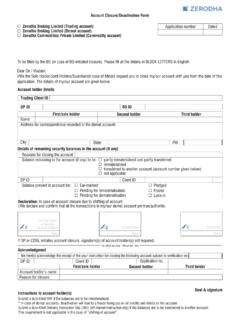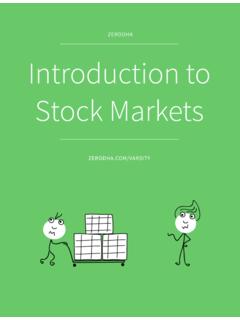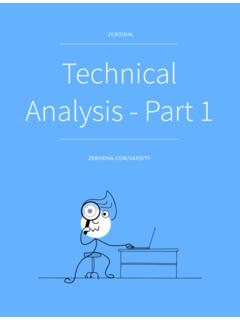Transcription of ZERODHA Markets and Taxation
1 Markets and ( Setting the context) is Income Tax ? tax slabs in India for the financial year 2014/1563 Classifying your Market you a trader or investor or and cons of declaring trading as a business are you ? Trader, Investor or Both144 Taxation for term capital gain (LTCG) term capital of note on STT, Advance Tax, and and Long term capital losses285 Taxation for Traders of trading/business forward business speculative and non speculative business income33 TABLE OF CONTENTS is tax loss harvesting ? (ATST) - Is it Speculative, Non Speculative or Tax - Business sheet and P&L and Tax audit366 Turnover, Balance Sheet and P&L and Tax sheet, P&L , Book of Accounts457 ITR forms (The Finale) Tax Return (ITR) forms and its ITR FAQ and notes53I remember a time (maybe about 6 years ago) I had the opportunity to meet one of those hard to find Charted Accountants who knew both Taxation and Markets quite well.
2 It was at a friend s party that I got introduced to him. He asked me what I do for a living, to which I promptly replied that I trade for a living. We immediately struck a chord and had a great conversation going. Somewhere during that engaging conversation he asked me a few questions How would I declare my Profits and/or Losses from my market activity? Do I bifurcate between speculative business income and non-speculative business income? Also, he asked me about the books of accounts that I m supposed to to my ignorance I had no answers to give was an eager learner, as I spent all my time learning about the Markets and trading strategies but spent very little time learning about Taxation and its relevance to market the reason why I consciously ignored learning about Taxation was because I always feared the heavy usage of jargon, random references to sections, subsections, circulars, and whatnot.
3 To my defense I once did honestly try to learn about Taxation . I paid a visit to my broker s office and met my dealer and questioned him on Taxation . This is what he had to say Arre, why are you so worried? Long-term capital tax is 0% and short-term capital gains tax is 10%, that s it, it is a simple matter. I for sure knew it was not just that, I insisted to meet someone more knowledgeable to understand the topic in greater detail. To my luck I got to meet the Regional Head of the stock broking company, enthusiastically I picked his brains about Taxation for market participants; unfortunately even he re-iterated the same thing that my dealer had told me. It seemed even worse as the regional manager had a sense of pride while he gave me that sloppy , I visited a CA and he essentially said the same thing that my dealer said, but he used fancy jargon and complicated the whole matter to no end.
4 At that point in time nobody had blogged about it online, no good articles were written on the topic and thus my quest to learn Taxation re-lated to Markets got squashed like a (Setting the Context)1 CHAPTER retrospect, had I known more about this topic, had I got more information I would have clearly benefited in multiple m certain there are many traders and investors in a similar situation as I was few years ago. In fact this is true considering that our blog on Taxation (which was put up a few years ago) has re-ceived over 2000 questions! This number is besides the numerous emails received and queries asked on Trading Q& this in perspective, we are happy to introduce our new module on ZERODHA varsity aptly titled Markets & Taxation . The module deals with literally everything that you need to know about Taxation related to Markets be it short term capital gains, or treating your intraday trades as speculative business income, or about Section 44AD we have it all on ZERODHA varsity in one place, concise, and here is the best part the whole module is authored by Nithin himself, which means that we get to learn about Taxation from a trader/investor s perspective and not really from the CA s per-spective.
5 This makes a huge difference in terms of topic narrative. With a seasoned trader discuss-ing Taxation , we get to learn about the essential topics without digressing into the Taxation , if I look back in time, I could not imagine brokers giving out such valuable information to clients. In fact, stock brokers were always known to hoard information and pass it only to select clients. I m sure you would agree with me on this, especially if you have been trading the Indian for a while now. Stock Brokers in India have always been snobby, expensive, and full of unwanted the stock broking industry is slowly waking up to the fact that the customer, irrespective of his size deserves the best. This change in attitude is leading to a revolution of sorts in the indus-try and I do believe ZERODHA is the epicenter of this revolution changing the way the Indian broking industry functions.
6 Be it providing you high quality tools to trade, better trader educa-tion, or ready to use tax friendly reports ZERODHA has it all for please do go ahead and explore this unique module on Markets & Taxation . I can assure you that the content presented here will make you more confident about matters related to Taxation , and with that new-found confidence you will never have to fear the taxman!Stay connected, stay profitable. Karthik OverviewIndia needs help from all of us countrymen in developing a tax culture. The fear about income tax department can be removed only by gaining knowledge on all the basic rules and regulations. In-come tax rates in India have drastically reduced from over 90% in the early seventies to now (2015) where no tax has to be paid on annual income upto Rs But the apathy of taxpayers towards filing income tax returns and paying taxes continues till the systems used by the IT department becoming sophisticated every year, the chances of repercussions in terms of notices and penalties due to non-filing, mis-filing, and hiding informa-tion while filing your income tax returns (ITR) is going up significantly.
7 Similar to how Income tax (IT) department has access to all your bank account details, they can also check upon all your capital market activity easily through the exchanges as they are all mapped to your PAN (Perma-nent account number).Even if the intent is there to be compliant, most people including many Chartered Accountants (CAs) don t understand the subject of Taxation when investing & trading very well. We had put up blog post, Taxation Simplified on Z-Connect a few years back simplifying key aspects of taxa-tion for market participants. Over the last 2 years we have received a few thousand queries on the post. Answering all of them it was obvious that we had to do a lot more to simplify all aspects around Taxation while trading or investing in the Markets , hence this you only invest into stocks or mutual funds filing returns is quite simple, but can get tricky if trading intraday stocks or financial derivatives (futures and options).
8 We will in this module break all the concepts down into small easy to understand chapters with-out any of those jargons typically used by CA s or tax consultant s. Here is a sneak peak into what you can expect going forward in this module 1. Introduction (Setting the Context)2. Basics3. Classify your Market Activity4. Taxation for InvestorsBasics4 CHAPTER Taxation for Traders6. Turnover, Balance Sheet, and P&L7. ITR Forms (The Finale) What is income tax?It is a tax levied by the Government of India on the income of every person. The provisions govern-ing the Income-tax Law are given in the Income-tax Act, 1961. In simpler words, Income Tax is a portion of money that you earn paid to the government of should I pay tax?Yes India does not offer social security and free medical facilities as being provided in some devel-oped countries, but the government needs funds collected as taxes to discharge number of re-sponsibilities like Government hospitals, Education, National defense, Infrastructure develop-ment just to name a is supposed to pay income tax?
9 Income-tax is to be paid by every person who earns more than the minimum income slab set by the government. The term person as defined under the Income-tax Act covers in its ambit natu-ral as well as artificial persons (including corporate). percent of over 121 crore population are taxpayers in India compared to over 45% in a de-veloped economy like Part of the reason for such an abysmally low number is also because many Indians don t earn enough to qualify to pay income tax, but the larger factor has got to do with lack of tax have to be paid based on how much income you earn every financial year. Financial year in India starts from April 1st and ends on 31st March. Do note that year can be specified either as fi-nancial year (FY) or assessment Year (AY).FY is used to denote the actual year the income was earned for which you are filing taxes.
10 So FY 2014/15 is the financial year starting April 1st 2014 and ending 31st March is used to denote the year in which you are supposed to file your taxes. So AY 2015/16 is the year when you file the returns for income earned in FY 2014/15. So AY 2015/16 and FY 2014/15 are one and the same. So you will use ITR with AY 2015/16 on it to file your taxes for the income earned in financial year starting April 1st 2014 and ending 31st March Income tax slabs in India for financial year 2014/15 All Indians have to pay taxes on the total income earned every year as per the below tax slabs they belong to. If you are salaried, your employer would already be paying taxes on your behalf to the government and issuing you a Form 16 as an acknowledgement for having paid the taxes. Your employer will not have access to all your sources of income, like bank interest, capital gains, rental income, and others.













![VARSITY DATE EVENT ROUND OFFICIAL [ ] JV](/cache/preview/d/e/2/d/a/9/d/9/thumb-de2da9d900ba82e4c6ce0aada4e07df8.jpg)

